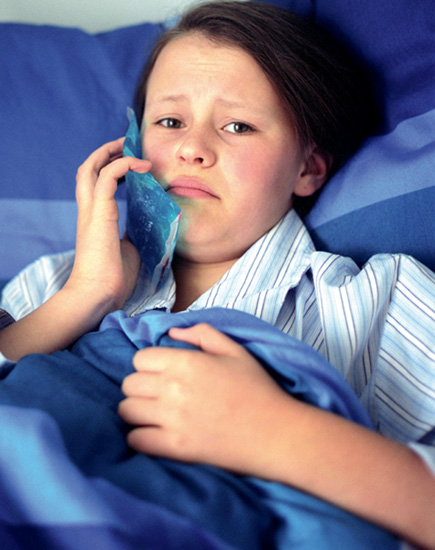Eat an apple a day to strengthen your gums.
Sugary foods produce acids that attack enamel and can result in tooth decay, especially in the young. As we get older, gum and periodontal diseases are the major threat. Fortunately, there is a lot you can do to keep your teeth and gums healthy and looking good.
Pressure sores and injuries from dentures, plus plaque and tartar, can lead to inflammation of the gums accompanied by redness, pain, bleeding and even receding gums if left untreated.
• Clary sage oil disinfects and alleviates pain. Put 4 drops into 1/2 cup (125 ml) warm water and gargle with it several times a day, but don’t swallow it.
Note: Be careful not to swallow any mouthwashes containing essential oils.
• For a simple mouthwash, dissolve 1 teaspoon (5 ml) salt in a glass of water.
• The tannins in strong green tea have a tightening, anti-inflammatory effect. Steep 1 tablespoon (15 ml) green tea in 1 cup (250 ml) boiling water, cool and strain. Use as a mouthwash two to three times a day.
Home remedies can alleviate the pain of a cavity but you’ll need to see a dentist to fix it for good.
• Tooth pain improves quickly when you pour clove oil on a cotton ball and hold it against the painful tooth. If you don’t have clove oil, place a clove on an aching tooth and bite down on it carefully.
• Roll a savoy cabbage leaf with a rolling pin until soft and press it against the outside of the appropriate cheek.
• Rub the gums surrounding a painful tooth with a crushed garlic clove.
• Rinse your mouth three to five times a day with an analgesic mixture of arnica, sage and chamomile. Mix together 2 teaspoons (10 g) arnica, 2 tablespoons (30 g) sage and 3 tablespoons (45 g) chamomile. Pour 1 cup (250 ml) hot water on 1 tablespoon (15 ml) of the mixture, strain and cool.
• Ice cools and soothes pain: Hold an ice pack on your cheek or suck an ice cube.
• Willow bark and meadowsweet contain substances related to aspirin. Tea made from these herbs will help relieve tooth pain.

A COLD PACK provides QUICK relief from TOOTH PAIN.
• Have your teeth cleaned and checked by a dentist and a dental hygienist at least once a year, even if you are not experiencing problems. Go every 6 months if possible.
• To cleanse your mouth of bacteria, rinse it thoroughly several times a day with tea tree oil (3–4 drops of tea tree oil in a glass of warm water) after brushing your teeth. Be careful not to swallow it—tea tree oil is poisonous.
• Regularly use mouthwash containing sage or chamomile to clean and disinfect.
• Massage gums regularly with your fingers to strengthen them. Apply gentle pressure and work in circular motions.
• Keep your diet low in sugar, on which bacteria thrive, and your teeth and gums will benefit.
• Brush your teeth two to three times daily, after each meal.
• When you brush, use toothpaste containing fluoride to harden your teeth.
• Replace your toothbrush regularly every 2–3 months, because the bristles soften with use and become inefficient at cleaning.
• If you are on the go during the day and have no chance to brush, chew some special teeth-cleaning or sugar-free gum to stimulate saliva production and help to remove food particles.
• Eat tooth-friendly foods. After meals, eat nuts or cheese, which counteract acidity, or a fibrous food such as celery, which removes plaque.
• Don’t smoke. Smoking is a major cause of periodontal disease, when pockets form between the gums and teeth causing foul breath from the constant discharge of pus.
Cleaning teeth properly
one Use dental floss or a dental water jet to remove food particles from between your teeth.
two Use the red-to-white technique when brushing: Always clean from the gum towards the tip of the tooth.
three Brush the chewing surfaces of your teeth.
four Thoroughly rinse your teeth and gums with mouthwash.
Teeth aren’t built to withstand constant grinding. Anger, worry and poor alignment are the most frequent causes of tooth grinding, which can lead to tooth wear and gum problems.
• Go to the dentist to find out if tooth misalignment, fillings or crowns that don’t fit properly are the cause of the problem.
• Try relaxation techniques if psychological strain is causing the grinding. They may provide relief.
• Use a mouthguard, fitted by a dentist, to reduce the impact of tooth grinding at night.
GOOD TO KNOW 
Nighttime trick
Avoid grinding your teeth at night by using this simple trick: Chew a hard crust of bread or a carrot before going to bed to tire out your jaw muscles.